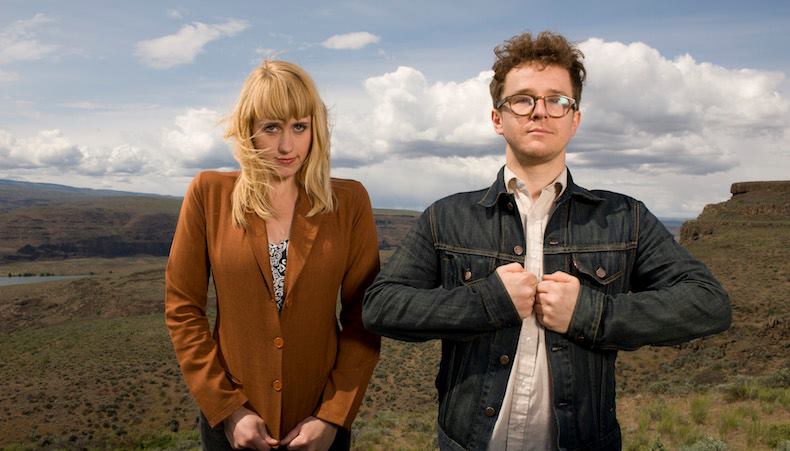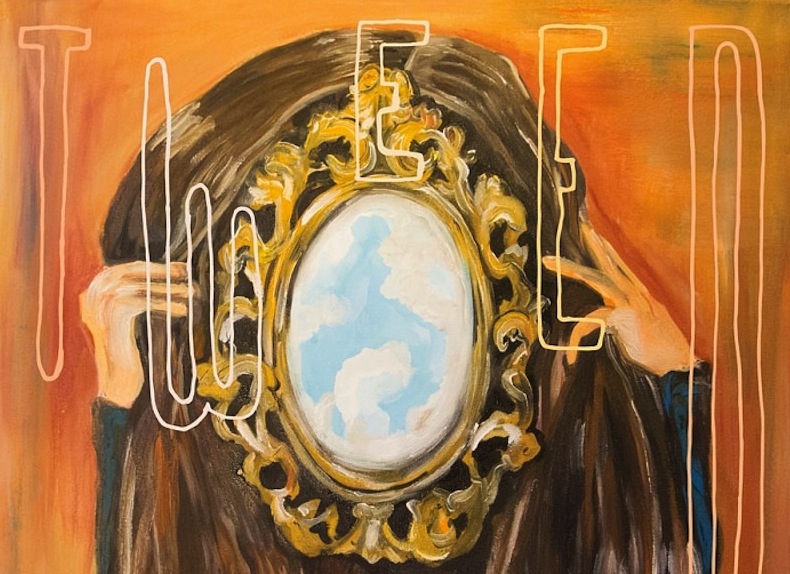
Rooted in indie rock and Maryland tree metaphors, Wye Oak has always been hard to pin down by its leaves. Ten years of songwriting together, and the duo of Jenn Wasner (vocals/guitar) and Andy Stack (synth/drums) holds four full-length albums experimenting onward from acoustic origins into what, at points, begs the question: What defines this band? After all, Wye Oak’s giant leap from 2011’s much-loved Civilian and 2014’s cutting Shriek drew a resounding “they sound different” when Wasner traded in her guitar for a bass.
But according to the group’s newest release, there’s more on an artist’s roadmap than points “A” and “B.” Tween is a side-step from Wye Oak’s discography, lined with songs born between the bookends of two distinct records but that fit into neither. “It’s not lesser than. It’s just different,” said Wasner, who dubs the eight-song collection as a “non-album” for reasons you can find, and contemplate on, below.

Allston Pudding: First off, what led you to bringing these songs back for Tween?
Jenn Wasner: Actually in the process of moving, which happened about a year ago and was the first time I’d ever moved away from Baltimore, which was my home for the first 29 years of my life. When you do a big move, you take stock of what you have. I was kind of just going through everything that we had made over the past several years, and we discovered a lot of this stuff. I had this moment of “Why did we abandon these?”
We know why we abandoned these. I often use the metaphor that making a record is like writing a novel, where some songs are short stories, and they don’t fit together as a giant, cohesive narrative. These are the short-story songs. For that reason, we never really knew what to do with them, but I think it’s pretty good when you rediscover something a few years after the fact and still like it.
Just as a creative exercise, we started working together and finishing them with the skill sets we have now and seeing what would happen, not necessarily with an eye toward a release. Eventually, we were so happy with the way they turned out we wanted to share them. So, it became this “not album”: Tween.
AP: When you say you “found” them, were they on your computer or had you written them down and physically found these songs in boxes?
JW: We had begun to record them. So, I had sessions and Mp3s that we had worked on. It was more about digitally taking stock of what we had. Also that’s something I tend to do when I’m thinking about writing for a new record: going through everything I’ve done and seeing if there are any ideas that have slipped through the cracks. In this case, there were quite a few.
AP: In the process of finishing them, did these songs transform, or is what we hear on Tween pretty true to those original recordings?
JW: I would say it varies from song to song. Some of them actually are new. I wrote the last song on the record “Watching the Waiting” kind of with the rest of the songs in mind, and that’s a weird thing to try and describe. I don’t know if I would have necessarily written that song if it weren’t for the influence of the others.
The ones that are old, I don’t think they transform so much as songs, but I do think our production capabilities are way better than they were when we wrote them. We’ve learned a lot in the past few years as far as producing. So, I think they definitely are much more powerful and much better realized now than they would’ve been had we tried to do this record three or four years ago.
AP: With that, did the fact that this wasn’t supposed to be an album in the first place help keep the songs organic?
JW: For us right now, we’re discovering that we’ve been a two-piece band for ten years. We started working on our first record a decade ago, which is insane. Like any relationship of that length, You have to really make an effort to enjoy making music for the reasons that you wanted to make music in the first place: because it’s what you love, because it’s free and because it doesn’t have to be anything. Beginning work on these songs, we were just loving the idea that we could do whatever we wanted. It didn’t have to be anything in particular because it wasn’t going to be “the next Wye Oak record.” That took a lot of pressure off of us.
AP: Beside the fact that they neither fit into Civilian nor Shriek, what other common threads exist between these songs?
JW: When I talked about “Watching the Waiting” being linked to the rest of the songs, I think it also functions a little bit as a thesis statement. That song starts out with the line “When I made my plan, there were some things which I could not account.” Basically, everything in my life for the past several years has unfolded in a way I could not have predicted, and it’s been really important, really trying and really wonderful all at once. I think, often that’s what creativity feels like to me. You sit down with an intention, a purpose, something you’re trying to achieve, and it turns out like nothing you could have ever imagined.
My relationships to the process and to the things I make have been so encumbered with weird guilt, shame, wishing I was something else and wishing the things I make were somehow different or better. I’m at this point in my life now where I’m really ready to let go of that. Allowing these songs to be out in the world and allowing myself to release things as I see fit, I feel like it’s a culmination of many years of emotional and psychological work for me of learning to put positivity out there. I’m alive. So, as a common thread, these songs are different points on that path. “Watching the Waiting,” embodies where I eventually ended up, which feels now like a pretty good place to be.
AP: That said, is this or is this not an album? Why or why not?
JW: We’re going with “not album,” which is a really sneaky way of having it be both. Initially we were like “Maybe we’ll put it out as an EP,” but everyone in our record label said “Well, you could, but nobody buys EPs. Maybe don’t call it that.” Also, when we started out, we didn’t realize it was going to be eight songs. That’s definitely album territory. So, in the way that it’s a bunch of songs then, technically, yes. It constitutes a record.
What makes it a “non-album” in my mind is similar to what I was saying before. When you create a record and you have a cohesive idea or concept of what it’s going to be, I usually have that concept before I start writing. I’ve done that for every record we’ve made, knowing what songs fit under that umbrella as it’s happening.
This record feels more to me like the collection of short stories to our records, our novels. We’re looking forward to making our next actual, proper record, but, in the meantime, this is a really special thing for us to be able to share. It’s not lesser than. It’s just different.
AP: Since these songs were written in between the “Point A” of Civilian and “Point B” of Shriek, what does Tween show about the identity of Wye Oak?
JW: Something we’ve been trying to come to terms with is that when you take a creative enterprise and try to fit it into the parameters of marketing and capitalism, it’s tricky. People whose job it is to sell records would very much like you to believe that everything travels in a straight line moving forward. I don’t really think time works like that, and I don’t really think creativity works like that. I think if you’re being true to your creative spirit and you’re not solely trying to make the most market-logical work, instead of a straight line you get a wiggly, spiral.
I feel like for better or for worse–for better being our creative output and for worse being our pockets–we are always going to be that kind of band. I’m not really capable of doing something that doesn’t call to me in that way, and I’m kind of a slave to the creative spirit wherever it takes me. The stamp of this record is that we’re always going to be the kind of band that follows that as opposed to given ways that make sense.
I hope there are people who are on board with that general ethos, who are interested in seeing where that wiggly line ends up because that is what this record is for, for us.
AP: That’s so beautiful.
JW: Thanks! [laughs]. It’s so strange trying to take things as wonky as inspiration and creativity and make them fit into this rigid format, and I think we’re still trying to figure out what this band can mean. The only way we can continue to be inspired about continuing is by letting it all naturally grow and evolve.
AP: Lastly, what were you like as a “tween”?
JW: Very good question. I was a stone-cold horse girl. I was deep, deep, deep into the horse scene. My next door neighbor at my parents’ house had a stable with six horses, and at that time in my life I was getting up in the morning to go take care of them before school and coming home to take care of them after. I was maybe just starting to play guitar, but way more at that time, I was like “I’m going to be a veterinarian, and no one can tell me otherwise.”
Wye Oak plays The Sinclair Sunday, June 19th. Tickets are $18 in advance / $20 day of.
